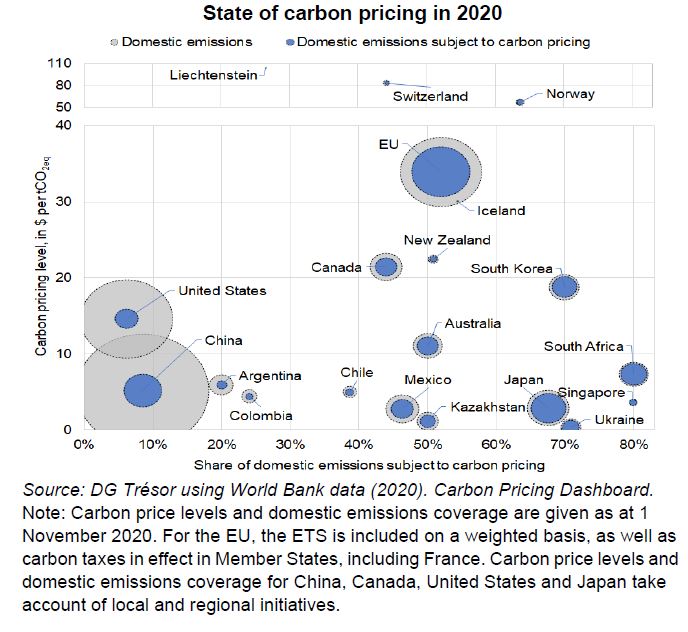A Carbon Border Adjustment Mechanism for the European Union
The EU plans to introduce a Carbon Border Adjustment Mechanism (CBAM) to tackle carbon leakage more effectively. This phenomenon corresponds to an increase in emissions in the rest of the world as a result of the implementation of more ambitious climate policies, such as carbon pricing, by some countries. A CBAM will enhance the effectiveness of European climate policies, and needs to address legal, technical, economic and political challenges to do so.
To achieve carbon neutrality by 2050, the European Union (EU) recently raised its greenhouse gas emissions reduction target for 2030 and plans to strengthen its climate policy instruments, starting with its carbon pricing policy via the Emissions Trading System (EU ETS).
As a result, the divergence with third countries level of carbon pricing (see graph) is expected to widen, posing an increased risk of carbon leakage for the EU. This phenomenon occurs when emissions in third countries increase after a country or region adopts more ambitious climate policies. This undermines the effectiveness of climate policies.
Ex ante modelling estimate carbon leakage to be in the range of 5-30%: in other words, for every 10 tonnes of emission reductions in the country or region implementing more ambitious climate policies, emissions in the rest of the world increase by 0.5-3 tonnes. Whilst it has proven difficult to detect carbon leakage empirically at EU level, in part because of low carbon prices in the past, more recent data suggest that carbon leakage is already taking place.
In June 2021, the European Commission will put forward its proposal for an EU carbon border adjustment mechanism (CBAM). Under this mechanism, EU carbon pricing would apply to imported goods in the same way as for emission-intensive goods produced in the EU. The aim is to tackle carbon leakage more effectively than existing instruments, within a framework compatible with World Trade Organisation (WTO) rules.
The EU CBAM must address a number of legal, technical, economic and political challenges. France has put forward proposals on how to tackle these challenges, favouring a gradual approach based on a system of allowances that mirrors the EU ETS and which accounts for the climate policies and levels of development in third countries.
